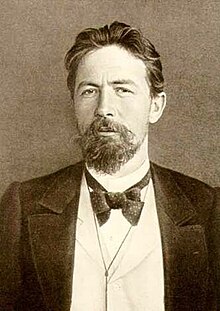Anton Chekov
| Anton Chekhov | |
|---|---|
 |
|
| Born | Anton Pavlovich Chekhov 29 January 1860 Taganrog, Russian Empire |
| Died | 15 July 1904 (aged 44) Badenweiler, German Empire |
| Resting place | Novodevichy Cemetery, Moscow |
| Occupation | Physician, short story writer, playwright |
| Nationality | Russian |
| Alma mater | First Moscow State Medical University |
| Notable awards | Pushkin Prize |
| Spouse | Olga Knipper |
|
|
|
| Signature |  |
Anton Pavlovich Chekhov (/ˈtʃɛkɔːf, -ɒf/;Russian: Анто́н Па́влович Че́хов, pronounced [ɐnˈton ˈpavləvʲɪtɕ ˈtɕɛxəf]; 29 January 1860 – 15 July 1904) was a Russian playwright and short story writer, who is considered to be among the greatest writers of short fiction in history. His career as a playwright produced four classics and his best short stories are held in high esteem by writers and critics. Along with Henrik Ibsen and August Strindberg, Chekhov is often referred to as one of the three seminal figures in the birth of early modernism in the theatre. Chekhov practiced as a medical doctor throughout most of his literary career: "Medicine is my lawful wife", he once said, "and literature is my mistress."
Chekhov renounced the theatre after the reception of The Seagull in 1896, but the play was revived to acclaim in 1898 by Konstantin Stanislavski's Moscow Art Theatre, which subsequently also produced Chekhov's Uncle Vanya and premiered his last two plays, Three Sisters and The Cherry Orchard. These four works present a challenge to the acting ensemble as well as to audiences, because in place of conventional action Chekhov offers a "theatre of mood" and a "submerged life in the text".
...
Wikipedia
